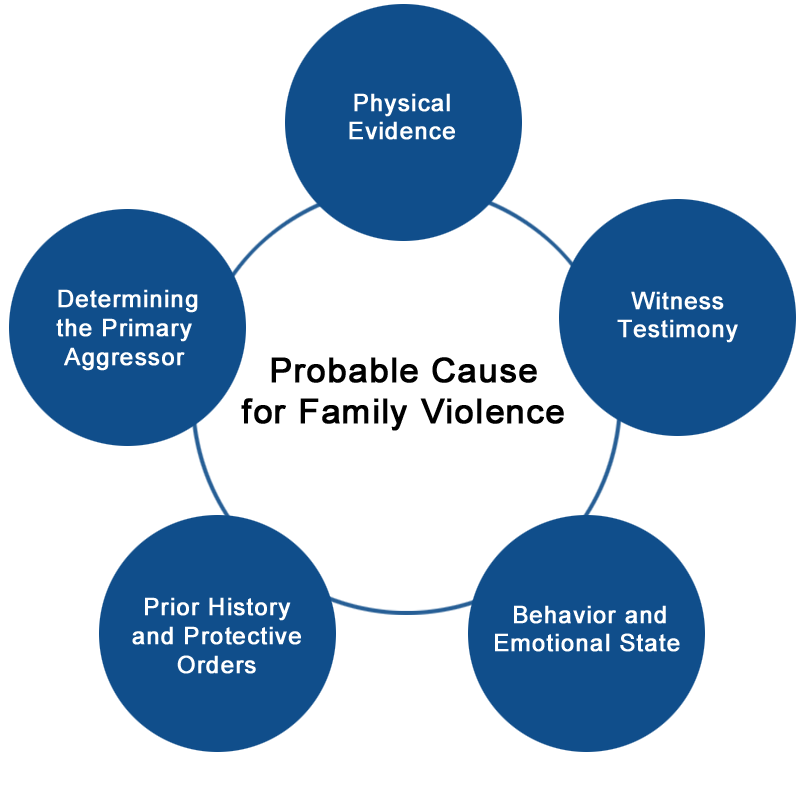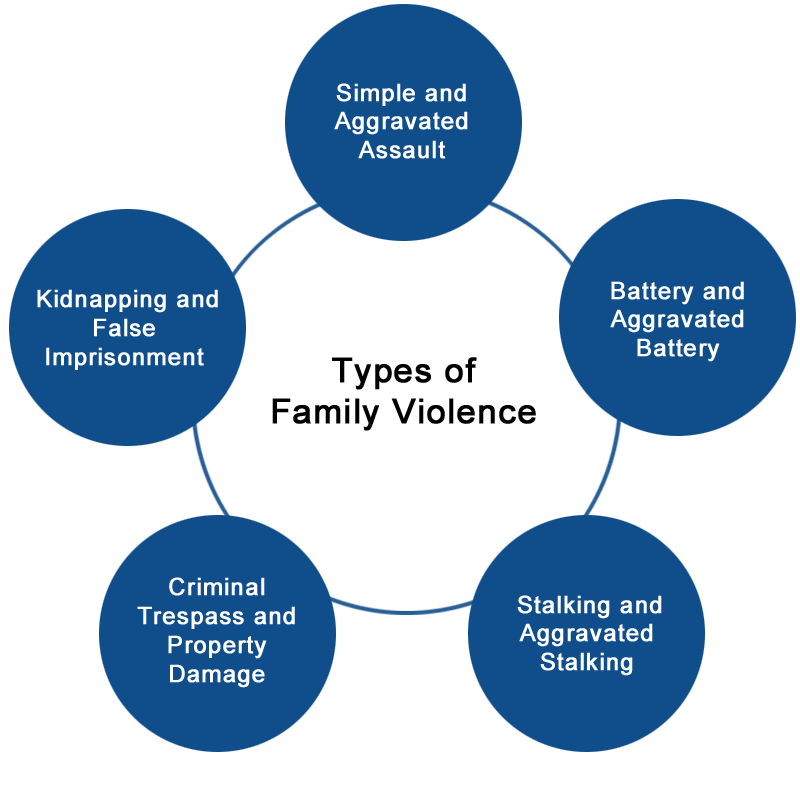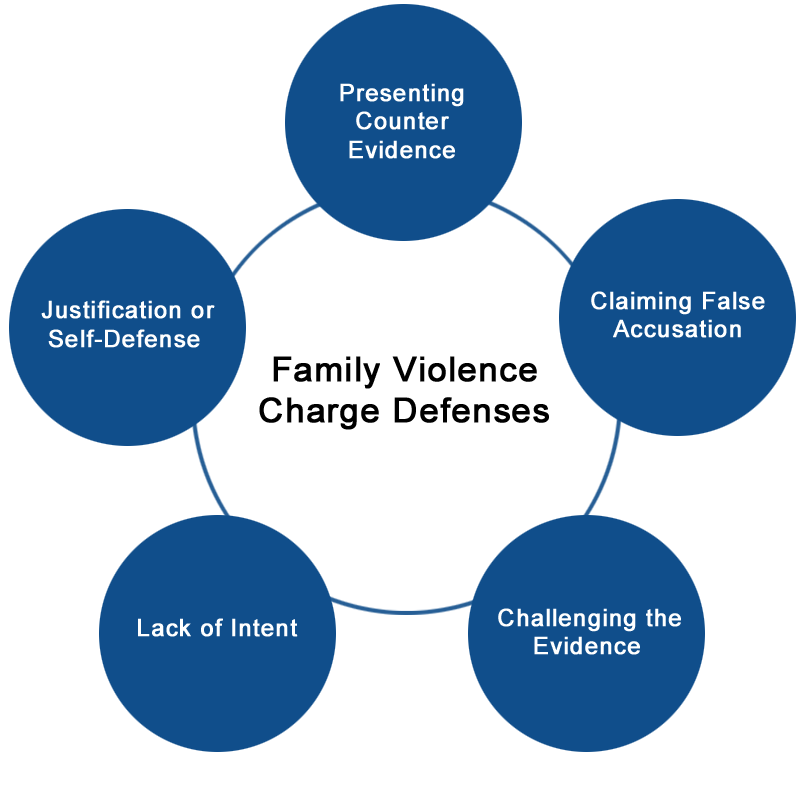In the context of Georgia law, the term “Family Violence” refers to actions that are harmful and directed between two people who are family members. This differs from the definition held by some states of “domestic violence” as this term recognizes family as a wide spectrum. In Georgia, family can include spouses, children, stepfamily, divorced or separated parents, foster families or others, whether they cohabitate or not. Family violence can include crimes such as assault, battery, unlawful restraint, trespassing, stalking or damage to property. In some cases, it can be elevated to a felony if the action is sufficiently harmful or heinous.

In order for an arrest to be made in a family violence case, law enforcement must establish “Probable Cause.” Probable cause is simply a term that means law enforcement can reasonably assume a crime occurred. They reach this conclusion through several factors, including:
- Physical Evidence: Signs of a struggle, damage to property, visible injuries to either party.
- Witness Testimony: Statements from both the victim and alleged assailant, as well as any eyewitnesses to the actual incident.
- Behavior: Determined by the arresting officer, this refers to both the victim and alleged assailant’s emotional state at the time of the interview.
- Prior History: Any previous incidents in which law enforcement had to get involved or protective orders were issued.
- Threats of Immediate Harm: If the officer determines that the victim may be in further danger of violence.
- Violation of Protective Orders: This can often lead to an immediate arrest.
- Determining the Primary Aggressor: In cases where both parties claim to be the victim, the officer determines which person initiated the violence.
Even if the victim chooses not to press charges, law enforcement can make an arrest for family violence if they establish probable cause as outlined above. In cases of stalking or simple assault, they can make an arrest without any physical signs of injury, as long as the victim was harassed or feared for their safety. Family violence charges are taken very seriously by the state of Georgia due to the high potential for generational trauma and physical harm. The state has several options available to it, including criminal penalties, severe penalties, protective orders and mandatory counseling, to address families affected by violence.
While the prosecution and law enforcement are held to strict standards and very specific guidelines in pursuing these charges, ensuring that the process is fair and equitable for everyone involved, false accusations can still occur. As such, they deserve to be defended with exhaustive preparation and thorough research.
Understanding Family Violence Charges in Georgia
It’s important to understand that a conviction for family violence charges stays on your criminal record permanently, whether for a misdemeanor or a felony. These charges cannot be expunged under Georgia law, however the visibility of these charges can be restricted if they are dismissed or the accused is acquitted.
These charges can also not be dropped by the victim. As soon as law enforcement establishes probable cause, it falls to the District Attorney to press charges, leaving the victim unable to affect proceedings through anything other than their testimony.
There are two reasons why the State retains the sole right to press family violence charges. The first is that it’s in the best interest of the state to prevent future violence and pursue charges if enough evidence exists. The second is that victims of family violence are often coerced by their abuser through threats or intimidation into dropping charges. Continuing independently from them renders any coercion pointless.
What this all means is that the prosecutor, and only the prosecutor, can decide to drop family violence charges if they believe their case will likely not result in a conviction due to weak or insufficient evidence. Otherwise, whatever the victim’s wishes, they can and will move forward with charges.
In addition to all of this, some charges may be prosecuted under the “Georgia Family Violence Act,” which applies to violent crimes like felony or misdemeanor battery and assault and can often apply to lesser crimes like property damage, false imprisonment or stalking if they certain family dynamics are involved. If the prosecution determines the offender was in violation of the act, they can pursue elevated protection for the victim including restraining orders, as well as more serious penalties for a conviction.
This is all, of course, subject to the statute of limitations – the legal window of time in which prosecution can pursue charges after the crime has occurred. For misdemeanor family violence, even high and aggravated misdemeanors, the statute of limitations is two years. This elevates to four years for felonies, but can be pushed as high as seven years in cases where the victim was a minor, or serious injuries resulted.
Beyond having higher penalties, family violence crimes are handled differently by law enforcement. While officers are generally given leeway to decide whether or not an arrest is necessary, they have less discretion in family violence cases and are required by law to make an arrest once they’ve established probable cause. Even if the victim attempts to explain the situation or plead to negate the arrest, the officer’s hands are tied in order to protect victims from retaliation or coercion.
Why Do These Laws Exist?
There are several reasons why the state of Georgia has strengthened laws concerning family violence. Because family violence crimes have higher penalties, particularly for repeat offenders, victims are protected from potential further harm and the pattern of abuse can be broken. Because law enforcement is legally required to make an arrest, offenders are unable to coerce their victims into dropping charges.
Domestic abuse works differently from other forms of abuse, and addressing these crimes requires a different dynamic. The harsher penalties exist to create greater consequences that are applied in a way that ensures the legal system can prevent generational harm.

Types of Family Violence
Georgia law lays out several different crimes that fall under the banner of “Family Violence.” These include:
Simple Assault (Family Violence): As outlined in OCGA § 16-5-20, simple assault is defined as an attempt to make another fear immediate harm or suffer injury without making physical contact. A misdemeanor, carries penalties including up to a year in jail, fines of $200-$1,000 or more, plus potential for probation, community service, counseling or screening for drugs and alcohol.
Aggravated Assault (Family Violence): Outlined in OCGA § 16-5-21, aggravated assault is defined as any assault which attempts to murder, rape or rob the victim, or that involves a deadly weapon. Classified as a felony, with potential as a high aggravated felony, penalties include a jail sentence of 1-20 years, fines up to $10,000, mandatory counseling, elevated court costs and potential for probation, community service, or screening for drugs and alcohol.
Simple Battery (Family Violence): Outlined in OCGA § 16-5-23, simple battery is an intentional act of offensive or harmful contact, or one that causes minor harm. A misdemeanor, this charge carries a prison term of up to a year, fines up to $1,000, mandatory community service of 40-80 hours, plus potential for probation and counseling.
Battery (Family Violence): Defined by OCGA § 16-5-23.1 as an intentional act that results in visible or substantial harm (such as bruises or cuts). Considered a misdemeanor on the first offense and a felony for subsequent convictions or in cases of aggravated circumstance, this charge carries a range of penalties. For misdemeanors, this includes up to a year in prison, elevated to five years in felony cases, as well as fines from $1,000-$5,000, likely counseling (especially when children are involved), plus court costs and potential probation and community service.
Aggravated Battery (Family Violence): Defined by OCGA § 16-5-24 as an action where a person, “maliciously causes bodily harm to another by depriving him or her of a member of his or her body, by rendering a member of his or her body useless, or by seriously disfiguring his or her body or a member thereof.” Classified as a felony, this charge carries a jail sentence of 10-20 years or more, fines up to $10,000 plus elevated court costs, mandatory counseling, plus likely probation and community service.
Stalking (Family Violence): Outlined in § 16-5-90, stalking refers to a person repeatedly contacting someone without their consent or following them for the purposes of intimidating or harassing them. Charged as a misdemeanor, its penalties include up to a year in jail, fines up to $1,000, plus potential court costs, probation, counseling and restraining orders.
Aggravated Stalking (Family Violence): Outlined in OCGA § 16-5-91, aggravated stalking occurs when the stalking itself violates a prior protective order or is tied to a separate family violence crime. Charged as a felony, penalties for this crime include a jail sentence of 1-10 years, fines up to $10,000, mandatory counseling, elevated court costs, and a high likelihood of probation and community service.
Criminal Trespass (Family Violence): Outlined in OCGA § 16-7-21, criminal trespass occurs when one family member enters another’s property without permission or causes damages that are valued at $500 or less. Classified as a misdemeanor, this charge carries a jail sentence of up to a year, fines up to $1,000, court costs and likely community service. Probation is often offered as an alternative to jail time for criminal trespass.
Criminal Damage to Property in the Second Degree (Family Violence): Defined in OCGA § 16-7-23, this crime describes property damage worth more than $500 or the reckless use of explosives or fire. A felony, carries a jail term of 1-5 years, fines up to $5,000 or more, high court costs, mandatory community service and likely probation after the jail sentence.
False Imprisonment (Family Violence): Outlined in OCGA § 16-5-41, false imprisonment occurs when one family member restricts another’s freedom without legal justification. Charged as a felony, carries a jail sentence of 1-10 years, fines up to $10,000 or more, higher court costs, plus the likelihood of community service and probation as part of sentencing.
Kidnapping (Family Violence): Outlined in OCGA § 16-5-40, kidnapping involves one family member forcibly taking or moving another family member against their will. Considered a felony, this charge carries a jail sentence between 10-30 years, with life imprisonment or the death penalty possible in aggravated cases, along with significant fines and court costs totaling up to $100,000 or more. This often includes mandatory counseling, and probation is not commonly offered but may be required after the prison sentence is served.
Interference with Custody (Family Violence): Outlined in OCGA § 16-5-45, this crime involves taking a child or family member without legal permission from their legal guardian. Charged as a misdemeanor on the first offense, it can be elevated to a felony in cases of repeat offenders or aggravated circumstances. As a misdemeanor, it carries a prison term of up to 1 year along with probation, elevated to 1-5 years with probation for felonies. Fines run up to $5,000 or more, with court costs and community service requirements varying.
Violation of Family Violence Protective Order: Outlined in OCGA § 16-5-95, this crime occurs when a person violates the terms of a court-issued protective order. Considered a misdemeanor on the first offense, or a felony where there have been previous violations or the circumstances warrant it, this charge carries jail time of up to a year with probation, or a sentence of 1-5 years with probation in felony cases. Fines also vary, from up to $1,000 for misdemeanors to $5,000 or more for felonies. Mandatory counseling and an extension or renewal of the initial order are also likely.
Because each of these crimes involves family members, their penalties are considerably higher, especially for second convictions. So for example, a charge of first-offense battery or assault outside of the family would carry a jail term of up to one year and up to $1,000 in fines. In a family violence situation, even simple assault is often charged as a “misdemeanor of a high and aggravated nature,” which carries fines as high as $5,000.
These penalties become even harsher when family violence is being charged as a second conviction, even those classified as misdemeanors, as they can result in up to five years in prison.
Alternatives to Jail for Family Violence Convictions
There are several options available to the state beyond jail time for first-time offenders or those convicted of crimes that didn’t result in serious injury. These alternative programs help rehabilitate offenders while maintaining the state’s commitment to protecting victims and preventing future violence. A few of these programs include:
- Family Violence Intervention Programs (FVIP): Involving counseling and education on the many factors that lead to family violence, this program helps offenders understand their abusive behaviors and work to change them. Because it is so effective, this program is often mandatory.
- Anger Management Programs: In cases where the violence involved was minor or it was a first offense, the prosecution may require those convicted to attend anger management.
- Probation: As an alternative to jail, this allows those convicted to resume their normal life while complying with a number of conditions ranging from regular check-ins with a probation officer to counseling or community service.
- Diversion Programs: In some counties across Georgia, the prosecution has the option to offer first-time offenders pretrial diversion programs, requiring them to complete community service, counseling or rehabilitation in exchange for a reduction or dismissal of charges.

Defenses Against Family Violence Charges
Because charges of family violence carry higher penalties than normal criminal charges, they require a robust defense built on solid strategies and thorough preparation. The consequences are greater, so it’s vital to see those charges dismissed, reduced or acquitted. A few strategies we employ include:
- Presenting Counter Evidence: This could include proving that the act in question occurred with the consent of the victim, establishing an alibi or gathering supportive testimony from eyewitnesses.
- Claiming False Accusation: Family squabbles can quickly devolve into lifelong vendettas, and in many cases, accusations are made out of anger, jealousy or as revenge for perceived wrongs.
- Challenging the Evidence: Law enforcement is not infallible, and it can often be shown that the evidence they’ve gathered – witness testimony or the officer’s observations – is unreliable or insufficient to prove guilt.
- Lack of Intent: In cases such as battery and assault, in which the prosecution must prove intent, a case could be made that the episode was incidental or was the result of a misunderstanding, but in either case was done without the intention of causing harm.
- Showing Justification or Self-Defense: This could involve showing that the accused was provoked into reacting to an immediate threat to themselves, to others, or to property.
Understanding Protective Orders and Temporary Protective Orders
Protective orders are the state of Georgia’s most vital asset for protecting family violence victims from physical harm, harassment or emotional abuse. A protective order acts as a long-term preventative measure against family violence, sometimes lasting between 1-5 years but occasionally extending for life in extreme cases, but temporary protective orders (TPOs) can be issued to provide immediate protection while the case makes its way through the courts.
To place this in a family violence context, a wife who is suffering physical abuse from her spouse could request a Family Violence Protective Order, which could force her spouse to leave their shared residence, break off all contact, and maintain a set distance of 300 yards from herself, her child, her home, her child’s school or her place of work. By creating physical space, this order protects against physical threats. By requiring the accused to break off contact, this order prevents harassment via phone, email or social media.
While the protective order is in effect, the wife can be granted temporary custody of the children. Along with forcing the spouse to comply with the order, the court could order the spouse to attend mandatory counseling. In some cases, the order can grant supervised visitation. If the spouse violated the protective order or failed to attend counseling, they could face immediate arrest, fines misdemeanor charges or even felony charges. They would be able to challenge the order, but only through a full court hearing within 30 days of the filing.
These temporary protective orders can be issued quickly, and typically last for up to 30 days to give the victim a chance to separate themselves from their abuser until a court hearing can be held to issue a long-term order. To obtain this order, the wife in our previous example would go to the superior court of the county where she and her spouse live, fill out a petition outlining the threats or violence she or her child had experienced, and receive a TPO pending a judge’s approval. If at any point she felt threatened, she could contact local law enforcement for immediate protection.
How We Can Protect You from Family Violence Charges
At Zeliff | Watson, we know that success in the courtroom depends on knowing more. Our approach prioritizes exhaustive research, creating a depth of knowledge that puts us steps ahead of the prosecution. From the moment we take your case, we launch an independent investigation that analyzes every detail and every aspect of your case. We work quickly to preserve important evidence, identify key witnesses who can speak on your behalf, and give ourselves time to review every police report, test result, court filing and piece of evidence. And as a result, we walk into the courtroom with the ultimate understanding of your case.
If you are under investigation or have been arrested on family violence charges, call Zeliff | Watson today for a free, no-obligation review of your case, either in person online, or over the phone. Taking that first step will let you see the options before you, even some you may not have considered, and help you rest easy knowing you have legal representation that will fight for you.
A Simple Process to Getting Started

Schedule a Free Case Evaluation
Schedule a free, no-obligation, and confidential case consultation in person, online, or over the phone. This will help you understand how your case can be challenged, potentially leading to a reduction, dismissal, or acquittal of your charges. Click here to schedule your case evaluation.

Meet Our Defense Team and Conduct a Case Evaluation
During your free case evaluation, you’ll have the opportunity to ask questions, receive answers and legal guidance, and collaborate with our attorneys to better understand your side of the story, gather evidence, and devise a strategy to achieve the best possible outcome for your pending criminal charges.

Start Defending Your Case
After your free case evaluation, Zeliff & Watson will assist in preserving evidence and safeguarding your rights, ensuring your protection throughout the process. The defense team will also provide a proposed fee to represent your case, with the goal of achieving the best possible outcome.

